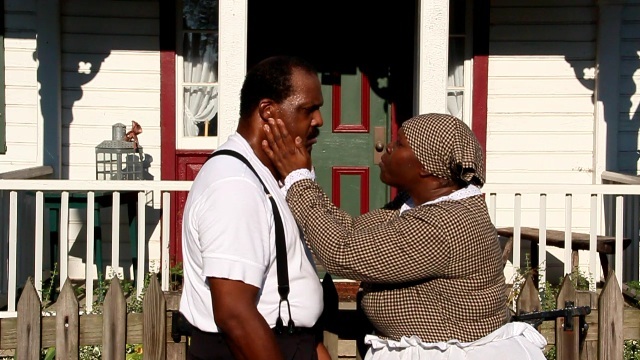Canton Group Brings The Disappearing Man to Life
Furious, the overseer stepped away from Mamma and kicked up dust with his boot…Then he picked up a stick, a sturdy one, and circled Mamma like he would a dangerous dog.
Henry had to act. He knew it now…The overseer moved behind Mamma and raised his club, targeting the back of her head. Mamma leaned forward, shielding Robbinet. The overseer paused just long enough for Henry to rush forward and step into the line of attack.
* Â * Â *
This tense confrontation from The Disappearing Man was shaping up to be the most difficult scene to film, says Frank Motz, an actor, director, and member of Canton’s One Book, One Community committee. Nevertheless, Motz and his team of actors decided to jump into the thick of the action. They tackled this scene first as they began filming The Disappearing Man, which was Canton’s selection for this October’s One Book, One Community program.
“In this scene, Henry’s family is being split up, and his Mamma is holding on to her youngest daughter, Robinnet, and the overseer literally has to tear her away from her,” Motz explains. “We were concerned about this scene because it required so much physical action and so much emotional reaction. But we did this scene on the first day of filming and it went great. It gave us a lot of confidence about our ability to do this.”
Since that dramatic beginning, Motz, along with Don and Janet Jones and 35 actors and actresses, have spent the summer filming a one-hour presentation of The Disappearing Man, to be shown October 27 at 7 p.m. in the Memorial Chapel at Malone University’s Johnson Center, 2600 Cleveland Ave., N.W., in Canton.
If you haven’t picked up a copy yet, The Disappearing Man is based on the true story of Henry “Box” Brown, a slave who mailed himself to freedom in 1849. Brown was sealed inside a wooden box, 3 feet by 2-½ feet by 32 inches, and shipped from Richmond to Philadelphia–one of the greatest escapes in American history.
Motz and the Joneses have been involved for many years with the Canton Players Guild, an institution in the area for 75 years. The three of them have a lot of combined stage experience, and Janet Jones even teaches drama to adults and teens, but this was their first foray into film.
In previous years, Motz and the Joneses have come up with unique presentations to supplement Canton’s annual One Book, One Community program. A few years ago, for example, the chosen book dealt with the internship of Japanese during World War II, so they recreated the internment experience for people arriving at the downtown theater, complete with soldiers and machine guns. Another year, Motz wrote a play based on the selected book, The Glass Castle.
“So people turned to me and asked, ‘What are you going to do this year?'” Motz says. In turn, he approached Don Jones, a Canton graphic artist and photographer, and asked, “Do you think we can make a film of this book? Don hesitated for about 15 seconds and then he said, ‘I think we can do it.'”
“It’s been a long journey,” says Jones, who took a crash-course in filmmaking and served as the director of photography. “But everyone has jumped on board, and it went great.”Â
The actors were all volunteer, and Motz and Jones say they landed a talented cast, headed by Rufus Malone, who plays Henry, and Roslyn Pratt, who plays his wife Nancy. The production team shot 30 different scenes throughout the summer at all manner of locations, including scenes that take place on a paddleboat and a locomotive.
“We were able to locate a paddleboat in nearby Janesville,” Jones says, “and we also stumbled across some guys who just happened to be building a multimillion dollar steam locomotive museum about a half hour south of us. They contacted us and said we’re just the kind of people they’re creating the museum for. So they fired up one of their enormous locomotives, hooked a couple of cars to it, and ran it up and down the property for us.”
According to Motz, Canton selected The Disappearing Man from a large number of possible books when it became clear “that every member of the committee liked the book a lot.” He says it is unusual to find a book that gets unanimous support.
With 2011 being the 150th anniversary of the start of the Civil War, the committee wanted to find a book that dealt with this particular time period. Many communities across the country are focusing on the battles and guns of the time, so Jones says he was thrilled that Canton chose to focus on the African-American experience.
“It was a great choice, a way to bring the community together,” he points out.
Added Motz: “I think it may have been the most fun I ever had in a production. There’s just something about actors performing when the film is rolling.”
By Doug Peterson

